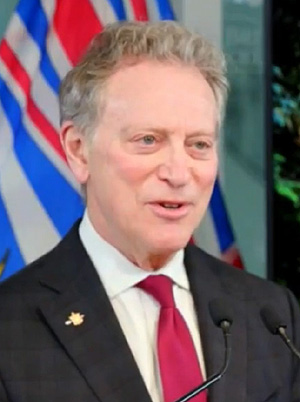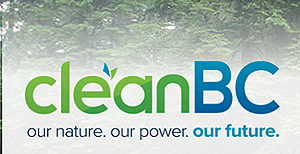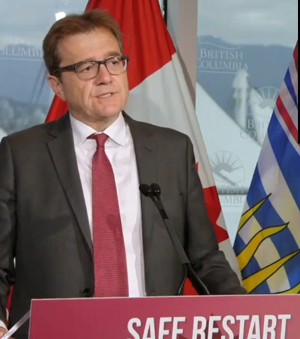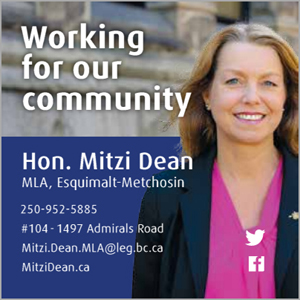Tuesday January 18, 2022 | VICTORIA, BC
Posted by Island Social Trends
Communities across British Columbia will be receiving record investments in critical projects to reduce pollution, increase health and expand opportunities in response to a changing climate.
Today BC Minister of Environment and Climate Change Strategy George Heyman together with federal Minister of Natural Resources Jonathan Wilkinson, announced the third intake to the CleanBC Communities Fund.
The governments of Canada and British Columbia have committed a combined investment of as much as $134 million for the third intake of the CleanBC Communities Fund, bringing the total investment to date to more than $240 million for local projects that increase clean energy and energy efficiency in buildings, transportation and other community-owned infrastructure.
“Investments in clean, efficient energy help support climate action and a healthy environment, while making life more affordable for families. They also contribute to the building of stronger, more resilient communities,” said Jonathan Wilkinson, federal Minister of Natural Resources, on behalf of Dominic LeBlanc, federal Minister of Intergovernmental Affairs, Infrastructure and Communities.
Infrastructure and jobs:
“The Government of Canada is pleased to contribute $73 million toward the CleanBC Communities Fund and partner with B.C. to promote energy-efficient infrastructure, create high-quality jobs and ensure a cleaner, more resilient future for communities across the province,” said Wilkinson.
The third intake will be open to projects that manage renewable energy, improve access to clean-energy transportation, improve energy efficiency of buildings or generate clean energy to reduce community reliance on fossil fuels.

“With communities across the province stepping up as leaders in the fight against climate change, our government is increasing supports to build a more resilient future for everyone,” said George Heyman, B.C.’s Minister of Environment and Climate Change Strategy.
“With more funding than ever before, we’re backing clean community infrastructure that will benefit people, provide good jobs and address the climate crisis head on,” said Heyman.
CleanBC Roadmap to 2030:
The third intake of the CleanBC Communities Fund will support actions in the CleanBC Roadmap to 2030 and add to previous rounds of funding. Applications for Round 3 funding opportunities open on Jan. 26 to local governments, Indigenous communities and not-for-profit and for-profit organizations. It also works to support initiatives outlined in the federal government’s Healthy Environment and Healthy Economy climate action plan, contributing to the success of national climate goals.
“As we continue to face the impacts of climate change together, increasing the amount of funding for communities to continue innovating with clean infrastructure projects is absolutely the right thing to do,” said Josie Osborne, Minister of Municipal Affairs. “Many local governments, Indigenous communities and organizations are leading the way on climate action with breakthrough initiatives that are reducing greenhouse gases and creating healthier, more sustainable communities.”
First round supported 16 projects:
The first round of program funding supported 16 community projects, including:
* waste heat recovery systems for Vancouver’s False Creek neighbourhood and Richmond’s Oval Village community;
* clean hydropower to reduce Nuxalk Nation’s reliance on diesel;
* electric vehicle charging network expansions across the province; and
* energy-efficient building upgrades for aquatic centres in Kamloops and Prince George.
“The CleanBC Communities Fund supported the City of Kamloops with funding for significant energy-efficiency upgrades to the Canada Games Aquatic Centre, an important community resource,” said Arjun Singh, member of B.C.’s Climate Solutions Council and City of Kamloops councillor. “This new round of funding is the largest offering yet from the provincial and federal governments and is an incredible opportunity for more communities to build better low-carbon infrastructure.”
Building on natural advantages:
The CleanBC Roadmap to 2030 is B.C.’s plan to expand and accelerate climate action by building on the province’s natural advantages – abundant and clean electricity, innovative technology and a highly skilled workforce. It sets a path for increased collaboration to build a British Columbia that works for everyone.
===== LINKS (Government):
CleanBC Communities Fund, including program and eligibility criteria and how to apply
Investing in Canada Infrastructure Program
===== BACKGROUNDER:
CleanBC Communities Fund
- The third intake of the CleanBC Communities Fund is supported by $60.6 million from the Province and $73.1 million from the federal government through the Investing in Canada Infrastructure Program Green Infrastructure stream.
- The Province administers the program and will accept funding applications for the third intake from Jan. 26 to May 25 with approvals expected in 2023.
- Successful projects from the second intake of the CleanBC Communities Fund are expected to be announced later this year.
- Projects may receive the following funding toward eligible costs*: as much as 33% provincial and 40% federal funding for local government projects; as much as 15% provincial and 75% federal funding for Indigenous off-reserve projects**; as much as 75% federal funding for Indigenous on-reserve projects**; as much as 25% provincial and federal funding for not-for-profit projects; and as much as 15% provincial and 25% federal funding related to for-profit projects.
- Funding recipients will need to contribute the remainder of the project cost share.
- *Indigenous recipients may access additional funding for a project, up to a maximum of 100% of eligible expenditures from all federal sources.






